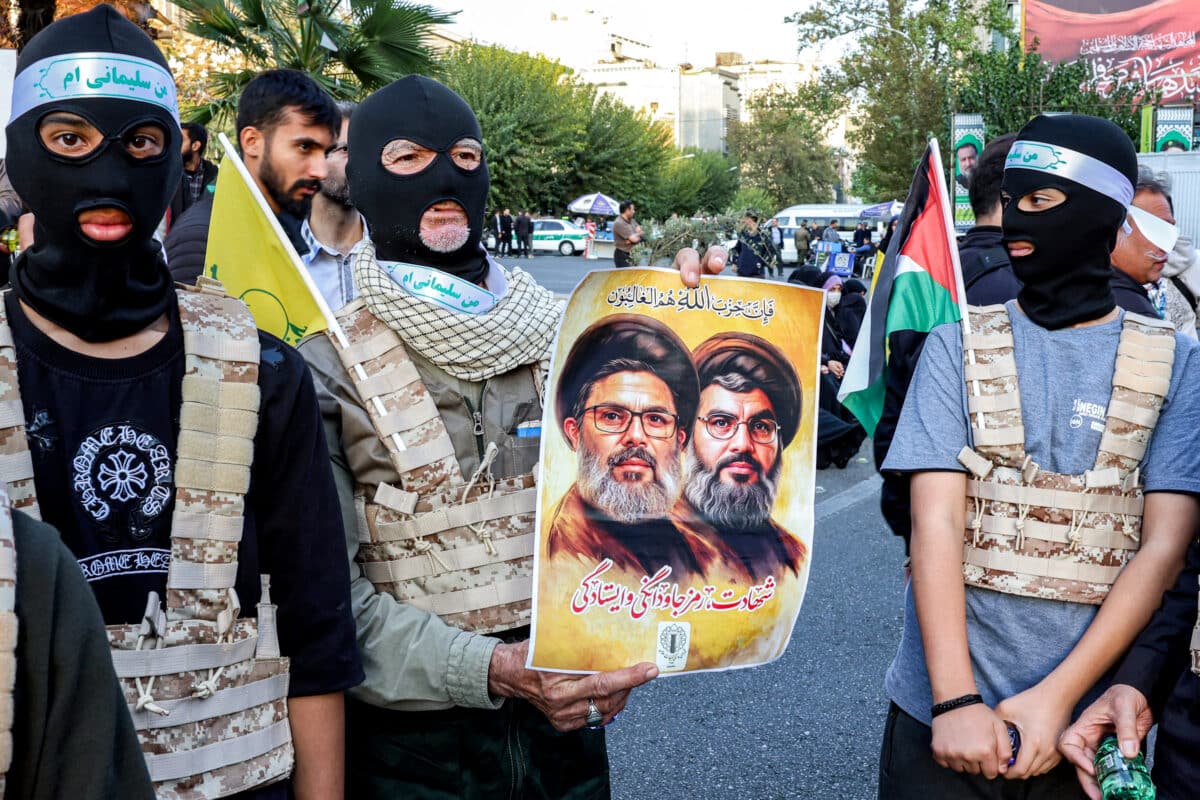
Masked demonstrators stand next to one holding a poster depicting the faces of Lebanese Hezbollah’s slain leader Hassan Nasrallah and Executive Council chief Hashem Safieddine, during an anti-Israel rally in Tehran on October 24, 2024. (AFP)
JERUSALEM – Israel said Thursday its spy chief will attend Gaza ceasefire talks and Hamas vowed to stop fighting if a truce is reached, as long-stalled efforts to end the war appeared to gain momentum.
Previous bids to stop the year-long war have failed, though the United States has voiced hope the killing of Hamas leader Yahya Sinwar last week could serve as an opening for a deal.
A senior Hamas official told AFP that a delegation from the group’s Doha-based leadership discussed “ideas and proposals” related to a Gaza truce with Egyptian officials in Cairo on Thursday.
“Hamas has expressed readiness to stop the fighting, but Israel must commit to a ceasefire, withdraw from the Gaza Strip, allow the return of displaced people, agree to a serious prisoner exchange deal and allow the entry of humanitarian aid into Gaza,” the official said.
The talks in Cairo were part of Egypt’s ongoing efforts to resume ceasefire negotiations, he added.
Israeli Prime Minister Benjamin Netanyahu said he welcomed Egypt’s readiness to reach a deal “for the release of the hostages” still held by militants in Gaza.
After the Cairo meeting, Netanyahu directed the head of Israel’s Mossad spy agency to leave for key mediator Qatar on Sunday to “advance a series of initiatives that are on the agenda,” the prime minister’s office said.
Earlier on Thursday, the United States and Qatar said Gaza ceasefire talks would resume in the Qatari capital.
US Secretary of State Antony Blinken met with Qatar’s leaders in Doha on Thursday on his 11th trip to the region since Hamas’s October 7, 2023 attack on Israel sparked the Gaza war.
‘Time is running out’
During the trip, which comes less than two weeks before US elections, Blinken said that mediators would explore new options.
He said they were seeking a plan “so that Israel can withdraw, so that Hamas cannot reconstitute, and so that the Palestinian people can rebuild their lives and rebuild their futures”.
Qatar said that US and Israeli teams would fly to Doha, with Prime Minister Mohammed bin Abdulrahman bin Jassim Al-Thani adding that Qatari mediators had “re-engaged” with Hamas since Sinwar’s death.
Blinken repeated his assertion that the killing of Sinwar by Israeli forces last week offered an opportunity for a deal.
Israeli and US officials as well as some analysts said Sinwar had been a key obstacle to a deal allowing for the release of 97 hostages still held in Gaza, 34 of whom the Israeli military says are dead.
An Israeli group representing families of hostages called on Netanyahu and Hamas to secure an agreement to free the remaining captives.
“Time is running out,” the Hostages and Missing Families Forum said.
Hundreds dead in days
On the battlefield, the Israeli military has kept up the pressure on Hamas, launching an operation earlier this month in the north of Gaza where tens of thousands of civilians are trapped.
“More than 770 people have been killed” in the territory’s north in the 19 days since the operation started, Gaza civil defence agency spokesman Mahmud Bassal said, adding that the toll could rise as people were buried under the rubble.
He also said a strike on a school-turned-shelter in central Gaza killed 17 people on Thursday, where the Israeli military said it was targeting Hamas militants.
Palestinian woman Umm Muhammad told AFP she was sitting in a classroom when the strike hit.
“I hugged my little girl and I couldn’t see anything through the thick plume of smoke,” she said.
“I ran and screamed for my sister and found her alive downstairs, but there were (some) children torn to pieces.”
The civil defence agency said it can no longer provide first responder services in northern Gaza, accusing Israeli forces of threatening to “bomb and kill” its crews.
The Israeli military says the goal of its assault is to destroy the operational capabilities it says Hamas is trying to rebuild in the north.
The Gaza war began with Hamas’s October 7, 2023 attack on Israel, which resulted in the deaths of 1,206 people, mostly civilians, according to an AFP tally of official Israeli figures.
Israel’s retaliatory offensive has killed 42,847 people in Gaza, the majority civilians, according to figures from the Hamas-run territory’s health ministry which the United Nations considers reliable.
‘Falling off a humanitarian cliff’
After nearly a year of war in Gaza, Israel expanded its focus to Lebanon a month ago, vowing to secure its northern border from near-daily attacks by Hamas ally Hezbollah.
It launched a massive bombing campaign targeting mainly Hezbollah strongholds around Lebanon, and sent in ground troops on September 30.
Since September 23, the war in Lebanon has killed at least 1,580 people, according to an AFP tally of Lebanese health ministry figures, though the real toll is likely higher.
The ministry said three children were among 12 people killed in Israeli strikes on two villages in eastern Lebanon on Thursday.
Another strike hit the southern suburbs of the capital, according to Lebanon’s official National News Agency, shortly after a new evacuation warning for the Hezbollah bastion.
Israel said four of its soldiers were killed fighting in southern Lebanon, scene of daily fighting with Hezbollah militants since the ground offensive began.
Hezbollah said it attacked Israeli troops and positions in Israel’s north and also soldiers inside Lebanese border territory.
The war has sparked a huge displacement crisis in Lebanon, already suffering from a years-long political and economic crisis.
A conference in Paris raised $800 million in aid for cash-strapped Lebanon, according to the French government.
Imran Riza, the UN’s humanitarian coordinator for Lebanon, warned that “Lebanon risks falling off a humanitarian cliff”.

